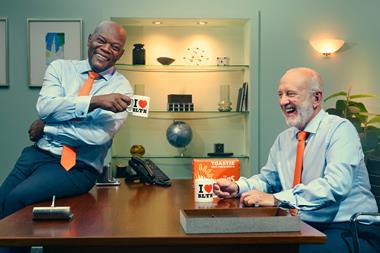Although free-from goods have become a staple part of many consumers’ diets and sales continue to soar, the market is not all plain sailing
Business is booming in free-from – but the explosive growth of the category is bringing new challenges.
This became clear last month with the news that Genius Foods, supplier of the market-leading brand in gluten-free bread, was abandoning its non-branded business and axing more than 100 jobs (see p6).
Announcing the changes, Genius chief executive Jeremy Bradley said: “In order to support our market-leading position, we need to simplify and focus on developing and investing in a strong Genius brand.”
The move came a few months after Boulder Brands, owner of the Udi’s gluten-free brand, pulled out of the UK following its acquisition by US food giant Pinnacle Foods and a consequent business review.
Industry insiders say such activity is a sign of growing competition in the gluten-free market as sales of free-from bread grow almost 25% year on year (Kantar Worldpanel). In other words, more than half the UK’s population purchased a free-from product over the first 12 weeks of this year, according to Kantar. These figures also include the burgeoning ‘dairy alternatives’ category, which is worth more than £200m.
Little wonder, then, that firms are continuing to invest in the category. Scottish-based oatcake and biscuit manufacturer Nairn’s Oatcakes spending £6.5m on a new gluten-free manufacturing operation after its existing free-from site reached capacity. And in March this year, CSM said its Kate’s Cakes site in Sussex – previously scheduled for closure – would be kept open to focus on free-from.
And, most recently, Premier Foods unveiled its first gluten and wheat-free Mr Kipling cakes (see below).
Such businesses will be targeting consumers who increasingly see gluten-free products as staple elements of their diet, with Kantar revealing dairy alternatives and gluten-free bread are driving growth in the frequency of free-from purchases.
Improvements in product quality are contributing to the rise in gluten-free, according to ingredients supplier Edme. “There is still work to be done, but in just a few years the quality of gluten-free baked goods has improved enormously,” says Edme sales director Mike Carr.
“In the past, bakers could get away with producing almost exclusively mainstream products using refined white flour. But now, they are drawing on a range of flours from whole-grain cereals, pulses and seeds. No more so than in the gluten-free sector.”
Manufacturers are continuing to explore processes to improve the taste and texture of gluten-free products, particularly in the light of demand for healthier and more natural food. Food and drink advisory service Campden BRI says effort is being made by the industry to address this.
“The industry is evaluating natural sources of fibre such as psyllium husk and apple fibre that are typically by-products from other processes,” Gary Tucker, head of baking at the cereal processing department of Campden BRI tells British Baker. “This provides a clean-label route to increasing fibre without increasing cost.”
Manufacturers are also making more use of liquid oils rather than hard fats, adds Tucker. “Challenges exist here in creating aerated structures and maintaining softness over shelf life, because liquid oils are not as functional as hard fats,” he says. “Considerable reformulation work is being done, using emulsifiers to maintain the functionality of the fats/oils in the products. There is a focus on natural sources of emulsifiers where possible.”
Edme’s Carr adds that, with the great range of flours on offer, there is no need for gluten-free bakery products to be low in fibre or high in fat. “Refined white rice flour and tapioca starch are not the only gig in the town. They can be replaced – or supplemented – by flours with more fibre, protein, vitamins and minerals,” Carr says.
“Pulses, for example, are a good source of protein, as well as being high in fibre and low in fat. They contain important vitamins and minerals, such as iron, potassium and folate.” (See speciality flours feature p47).
Also contributing to the success of the free-from market is activity such as Coeliac UK’s Gluten-free Guarantee (GfG). The national charity launched the campaign in 2014, asking supermarkets to commit to stocking a basket of eight staple gluten-free products across all stores in order to improve access to the sector.
Coeliac UK has stepped up its campaign further in recent weeks, urging smaller retailers to sign up to a new GfG basket, designed for convenience stores and containing four key items for those who need gluten-free goods.
Coeliac UK chief executive Sarah Sleet says consumer research has shown demand for more options in gluten-free on-the-go. “Half of our survey respondents say they try to buy food when they are out or at work, but still three-quarters of them tell us they find it difficult to buy something safe for them to eat,” she adds. “This is a market that is going to keep on growing and we encourage all convenience store retailers to commit to this new GfG campaign.”
Some c-store retailers still need convincing, however, with more than a third of independent retailers saying they won’t stock gluten-free options because of concerns over waste, according to The Vital Ingredient, a report by retail consultancy firm HIM on increasing c-store sales of bakery. “Suppliers need to offer advice on minimising wastage to encourage variety within wrapped bakery ranges,” states HIM in the report.
This might be a relatively minor challenge, though, for a category that has shown it is capable of overcoming hurdles to maintain explosive growth.
Gluten-free innovation
Schär Deli Style Sourdough Bread, Schär
Launched: March 2017
Schär, which is the fastest-growing gluten-free brand, according to IRI data, has developed four new bread and biscuit products. Rolling out in retailers such as Morrisons, the products include Deli Style Sourdough Bread (240g, RRP £2.50); Hamburger buns (4-roll pack at 300g, RRP £2.88); Choc Chip buns (4-bun pack, 220g – coming soon); and Viennese Biscuits (12-pack, RRP £1.73).
Too Good To Be, Addo Food Group
Launched: April 2017
Addo Food Group’s gluten-free pastry brand, which specialises in quiches, pies and tarts, last month rolled out a selection of new products to Morrisons, Sainsbury’s, Waitrose and Co-op stores. The new line-up includes: Red Thai Chicken Pie (200g, RRP £3); Steak, Red Wine & Shallot Pie (190g, RRP £3); Dark Chocolate & Salted Caramel Tart (115g, £2.50).
Prewett’s White Chocolate & Cranberry Cookies, Northumbrian Fine Foods
Launched: April 2017
The all-butter cookies are made from a variety of ingredients, including gluten-free oat flour, and contain white chocolate chunks with sweet cranberries. They are available to purchase from Waitrose at an RRP of £2.29. The company claims the cookies will be “well received by discerning customers in the free-from sector”.
Dawn Foods Muffin Mixes, Dawn Foods
Launched: March 2017
Available in chocolate and vanilla flavours, the new mixes have natural colours and flavours. They are also palm oil-free and FSA 2017 salt-compliant. The company says the mixes can be used to make a variety of loaf and family cakes, enabling bakers to offer a range of “cost-effective gluten-free products from one bag of mix”. Dawn says further gluten-free product launches will follow later this year.
Premier takes Mr Kipling into gluten-free
Premier Foods has recently extended Mr Kipling into the burgeoning free-from market, with the brand’s first-ever wheat and gluten-free loaf cake range
Rolling out in Tesco stores nationwide now, the range comprises three flavours – Apple Crumble, Cherry Bakewell and Lemon & Ginger, each priced at £3. The company has also launched Mini Cherry Bakewells, priced at £2.50.
The Mr Kipling gluten-free loaf cakes each serve eight people, while the Mini Cherry Bakewells are available in packs of two.
The launch is in response to soaring demand in the free-from market, which is forecast to reach £673m by 2020, according to Mintel.
Jo Agnew, brand director at Premier Foods, says the company is looking forward to seeing the response from shoppers.
“The new range takes Mr Kipling into the free-from aisle for the first time,” says Agnew.
“The free-from market shows no sign of slowing down and this is being driven not only by the 5% of UK adults who have a sensitivity to gluten, but also those who are cutting down as part of a lifestyle choice.”





























No comments yet